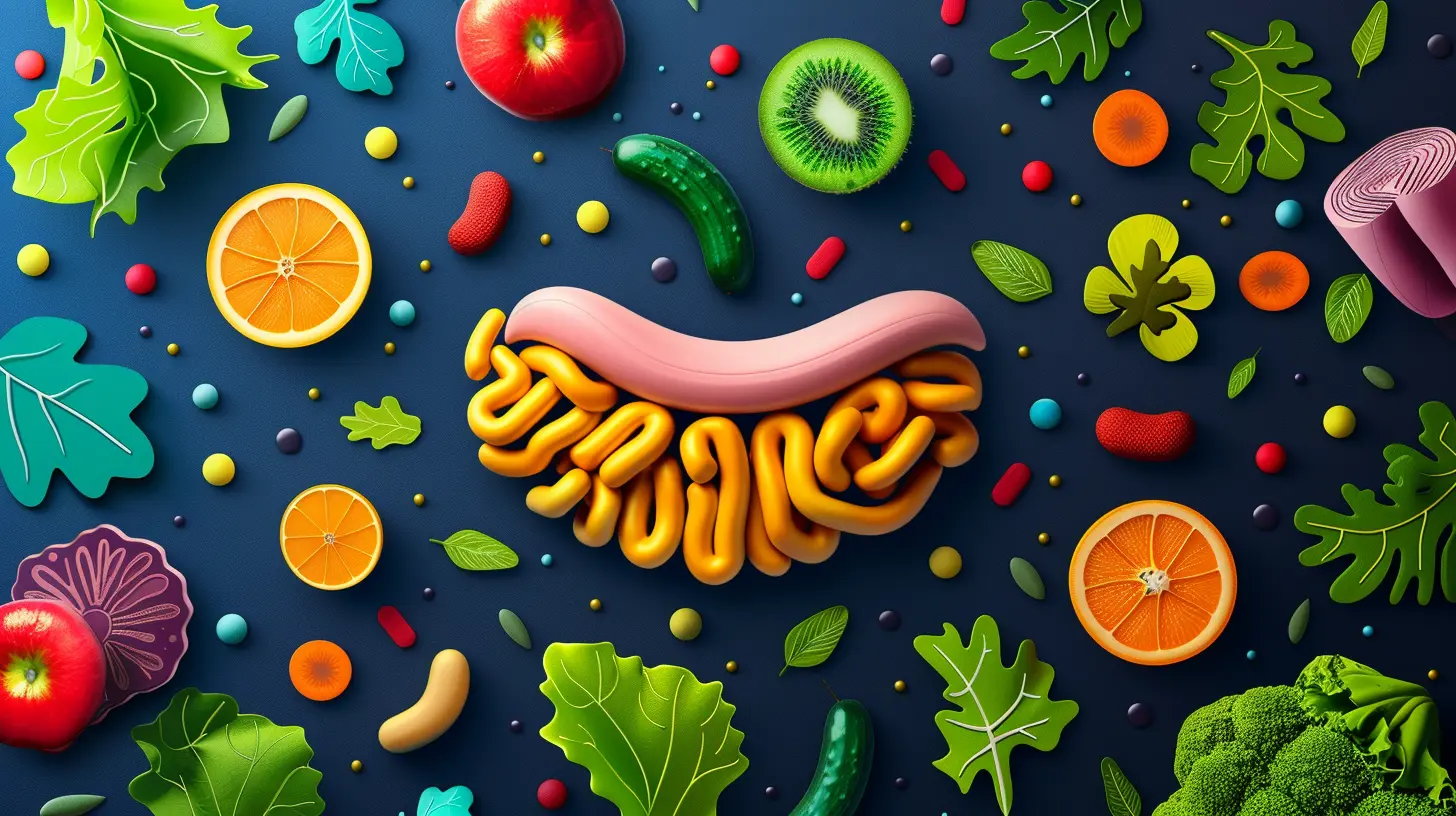Gut Health for Beginners: Where to Start for Optimal Digestion
2 October 2025
When was the last time you thought about your gut? Not just when you're feeling bloated after that extra-large pizza, but really thought about it as a key player in your overall health? If you're scratching your head, don't worry—you’re not alone. Gut health might not be the most glamorous topic, but it’s one of the most important when it comes to feeling your best.
Your gut is more than just a digestion engine; it's like the bustling control center of your body. From boosting your energy levels to keeping your immune system in check, everything ties back to the health of this "second brain." So, if you’re feeling lost on where to start, I’ve got you covered. Consider this your beginner-friendly guide to navigating the world of gut health! 
Why Gut Health Matters
Let’s start with the basics: why should you even care? Well, your gut is home to trillions (yes, TRILLIONS) of bacteria and other microorganisms—collectively called the microbiome. Think of it like a tiny city inside you, filled with helpful "residents" that work around the clock to keep things running smoothly.When your gut microbiome is in balance, you feel great: your digestion hums along happily, your skin looks vibrant, your mood is steady, and your immune system functions like a well-oiled machine. But when it’s out of whack? Cue the bloating, fatigue, brain fog, and a rollercoaster of other issues. 
Signs Your Gut Might Be Out of Balance
Before we dive into the "how-tos," let’s talk about the warning signs of a struggling gut. Your body has a way of waving red flags when things aren’t right internally. Do any of these sound familiar?- Frequent bloating, gas, or irregular bowel movements
- Food intolerances or sensitivities that seem to pop up out of nowhere
- Skin issues, like acne, eczema, or rashes
- Constant fatigue, no matter how much sleep you get
- Mood swings, anxiety, or a lack of focus (hello, brain fog!)
If you’re nodding along, your gut might be crying out for some TLC. But don’t panic; the good news is, your gut is surprisingly resilient! With the right changes, you can turn things around and start feeling better. 
Step 1: Clean Up Your Diet
Let’s be real: you can’t talk about gut health without talking about food. What you eat has a direct effect on your gut microbiome. If your diet is filled with processed junk, sugary snacks, and fried foods, it’s like inviting a bunch of rowdy party crashers into your tiny city of helpful microbes.Instead, focus on gut-friendly foods that help the good guys thrive. Here's your grocery shopping cheat sheet:
What to Add:
- Fiber-Rich Foods: Think fruits, veggies, whole grains, and legumes. Fiber is like food for your friendly gut bacteria—keep them well-fed, and they’ll reward you with better digestion.- Fermented Foods: These are probiotics in disguise! Stock up on yogurt, kefir, sauerkraut, kimchi, and miso to increase the good bacteria in your gut.
- Healthy Fats: Include avocados, nuts, seeds, and olive oil to help reduce inflammation and support a healthy gut lining.
- Bone Broth: Packed with collagen and amino acids, this helps heal and soothe the gut lining.
What to Avoid:
- Ultra-Processed Foods: Your gut bacteria weren’t designed to handle weird artificial additives.- Artificial Sweeteners: They can wreak havoc on your microbiome balance (and leave you craving more sweets).
- Excessive Alcohol: A boozy weekend might be fun, but it can irritate the gut lining if overdone.

Step 2: Stay Hydrated
Water might not seem like the MVP here, but trust me, it’s essential. When you’re dehydrated, your digestion slows down, which can lead to constipation and an unhappy gut. Think of water as the oil that keeps the engine running smoothly.Pro Tip: Add a slice of lemon or cucumber to your water for a refreshing twist—it’s like giving your old-school H2O a fancy spa treatment.
Step 3: Consider Probiotics and Prebiotics
If you’re serious about upgrading your gut health, supplements can help. But let’s break down the difference between probiotics and prebiotics first.- Probiotics: These are the live "good" bacteria you can add to your microbiome. You can find them in capsules or powders, or naturally in fermented foods (like we mentioned earlier).
- Prebiotics: These are the non-digestible fibers that feed your probiotics. Think of them as fertilizer for your gut. Foods like garlic, onions, asparagus, and bananas are loaded with prebiotics.
Quick tip? Start small with probiotic supplements. Jumping straight to a high dose can lead to bloating while your gut adjusts.
Step 4: Move Your Body
Exercise isn’t just for your muscles—it’s for your gut, too! Regular movement helps improve the diversity of your microbiome while keeping your digestion on track.Not a gym rat? No problem. Even a 20–30 minute walk after meals can do wonders for keeping things "moving."
Step 5: Manage Stress
Ever had a "knot in your stomach" when you’re anxious? That’s no coincidence. Your gut and brain are in constant communication via the gut-brain axis. When you’re stressed, your digestion can slow down, and your microbiome can get thrown off balance.Carve out time for stress-busting activities like yoga, meditation, or even just taking deep breaths. Your gut will thank you!
Step 6: Get Enough Sleep
Here’s the deal: a lack of sleep can disrupt your microbiome like a bad roommate who doesn’t clean up after themselves. Aim for 7–9 hours of quality snoozing each night to allow your gut (and the rest of your body) time to recover and repair.Step 7: Ditch the All-or-Nothing Mindset
Finally, let’s get one thing straight—improving your gut health isn’t about being perfect. You don’t need to overhaul your life overnight or swear off pizza forever (phew!). Small, consistent changes are what make the difference.Take it one step at a time. Maybe you start by adding more fiber to your breakfast. Or swapping soda for water. Over time, those little wins will add up to big results.
Key Takeaways for Gut Health Beginners
To wrap things up, here’s a quick recap:1. Gut health is essential for overall well-being (and a happier you).
2. Watch for warning signs like bloating, fatigue, or skin issues.
3. Eat more fiber, fermented foods, and healthy fats while ditching processed junk.
4. Hydrate like you mean it—your digestion will thank you.
5. Consider adding probiotics and prebiotics to your routine.
6. Move your body and prioritize stress management.
7. Sleep isn’t just beauty rest—it’s gut health rest, too!
Improving your gut health doesn’t have to be daunting. Start small, stay consistent, and tune in to how your body responds. Your gut is incredibly resilient—give it the love it deserves, and it’ll love you right back.
all images in this post were generated using AI tools
Category:
Gut HealthAuthor:

Jackson Mahoney
Discussion
rate this article
1 comments
Lauren McCollum
Great read! Understanding gut health can be overwhelming, but this article breaks it down perfectly. It’s reassuring to know that small changes can lead to big improvements in digestion. Thanks for sharing!
October 19, 2025 at 3:17 AM

Jackson Mahoney
Thank you for your kind words! I'm glad you found the article helpful in simplifying gut health. Small changes can indeed make a big difference!


